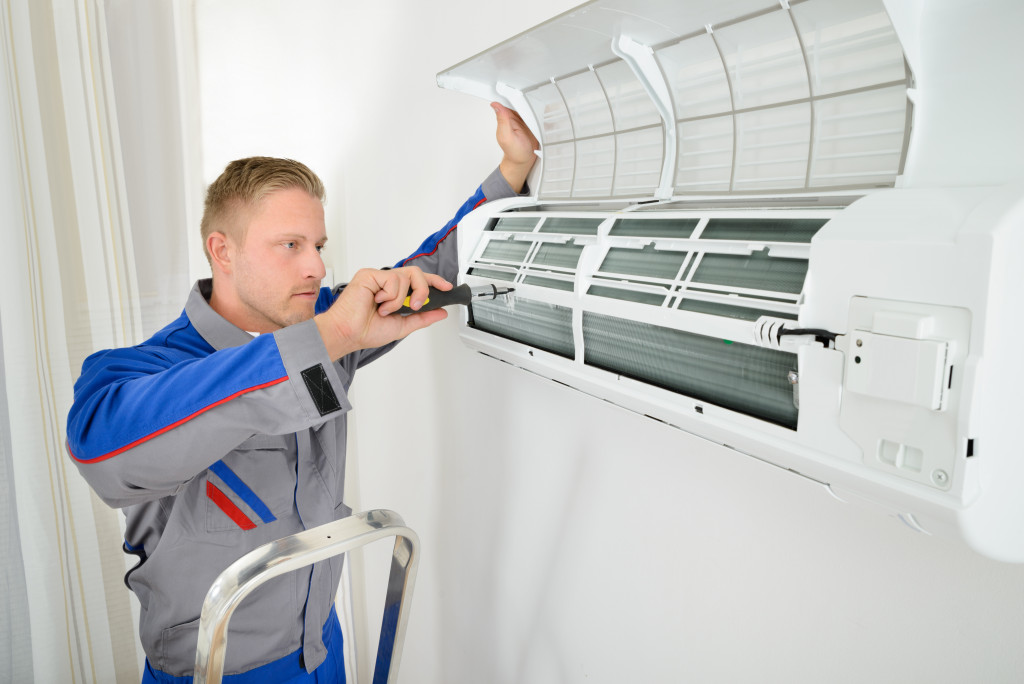- Household cleaning products like ammonia, bleach, and VOCs can cause eye irritation if improperly handled.
- Indoor allergens, including dust mites, pet dander, and pollen, can trigger eye irritation and other allergic reactions.
- Poor indoor air quality and high humidity levels can lead to eye irritation, dry eyes, and mold growth.
- Proper use and maintenance of air conditioning systems contribute significantly to indoor air quality and eye health.
- Immediate professional help is essential if problems with the AC system arise to maintain optimal indoor air quality.
The eyes are one of the body’s most critical sensory receptors, allowing you to see the beauty of the world around you. As such, you must keep them healthy and safe from harm.
While you usually focus on protecting your eyes from external factors such as dust, sun, and pollutants, people often overlook the hidden hazards within the safety of your home.
Many factors contribute to achieving good eye health. Avoiding eye strain, taking good care of contact lenses (if you wear them), and regular eye check-ups are ways to keep your eyes healthy. Apart from these, taking care of your eyes by keeping them safe from harmful household items is also essential.
This post will discuss the everyday household items that can cause eye irritation and how to keep your eyes safe.
Household Cleaning Products
Cleaning products help maintain your homes and keep them clean and hygienic. However, household cleaning products contain chemicals that can cause eye irritation and other related health issues.
Ammonia
Ammonia is a common household cleaning agent on floors and glass surfaces. It is an irritant that can cause eye irritation, respiratory problems, and even burns if not handled properly.
Keeping the area well-ventilated, wearing gloves, and keeping children and pets away from the room while using ammonia are some ways to prevent eye-related problems.
Bleach
Bleaches are commonly used to keep bathrooms, toilets, and kitchens sanitized. However, bleach fumes can irritate the eyes, nose, throat, and lungs. It is vital to use bleach in a well-ventilated area, wear gloves and protective eyewear, and keep children and pets away from the site.
Volatile Organic Compounds (VOCs)
VOCs are organic chemicals that have a high vapor pressure at room temperature. They are commonly found in household cleaning, paints, and other synthetic products. VOCs can cause irritation, headaches, and other health issues.
To prevent eye irritation caused by VOCs, it is crucial to use cleaning agents with low VOC contents, keep rooms well-ventilated, and wear protective eyewear while using synthetic products.
Indoor Allergens
In addition to cleaning agents, indoor allergens can cause eye irritation and other related problems. Here are some of the common indoor allergens that can cause eye irritation.
Dust Mites
Dust mites are tiny insects that feed on dead skin cells and can be found in almost every home. They are a common cause of allergic reactions, including eye irritation. Keeping your home clean and washing your bedding in hot water is essential to prevent these tiny bugs from irritating you.
Pet Dander
Pets are integral to ones lives but can cause allergies and eye irritation. The proteins in animal urine, saliva, and dander can trigger allergies and cause itchy eyes, redness, and other problems.
To avoid this, it is crucial to maintain good pet hygiene, keep pets off bedding and furniture, and vacuum regularly.
Pollen
Pollen is a common allergen that can cause itchy eyes, runny nose, and other problems. During allergy season (usually spring and summer), pollen counts are high and can cause eye irritation in susceptible individuals.
To protect your eyes from pollen-related irritation, wear sunglasses when going outside, close windows and doors to keep pollen out, and avoid going outside during peak hours.

Air Quality and Humidity
Indoor air quality and humidity levels are crucial for maintaining good eye health. Poor indoor air quality and high humidity levels are known eye hazards. Dust, pet dander, mold, and other air pollutants can cause eye irritation. High humidity levels can lead to dry eyes and mold growth.
Proper use of an air conditioning system can help prevent dry or overly humid indoor air, leading to optimal eye health. Here are a few tips for optimal air conditioning use:
Use a Humidifier or Dehumidifier
The air conditioning system can remove moisture during the hot summer, causing dry indoor air. A humidifier can add moisture to the air, helping prevent dry eyes. In contrast, a dehumidifier removes moisture from the air, useful in areas with high humidity levels.
Set the Thermostat to an Optimal Range
Setting a thermostat to 75°F is optimal for good eye health. Extreme temperatures can cause eye irritation, so it is essential to maintain a consistent and comfortable temperature.
Regularly Maintain Your AC System
It is essential to maintain your air conditioning system regularly. Clean or replace air filters regularly, as dirty filters cause poor indoor air quality. A clean AC system improves indoor air quality, protecting the eyes from pollutants.
If you notice any problems with your AC system, do not hesitate to call a reliable AC repair service. A technician can provide prompt and efficient repairs to ensure optimal AC system efficiency and indoor air quality.

Homes are meant to be a haven, but not when it comes to your eyes. Many common household items can cause eye irritation and other related problems.
It is essential to maintain good eye health by avoiding harmful household cleaning products, keeping rooms well-ventilated, and avoiding indoor allergens. Making small changes in your daily routine can go a long way in protecting your eyes and keeping them healthy for years.

